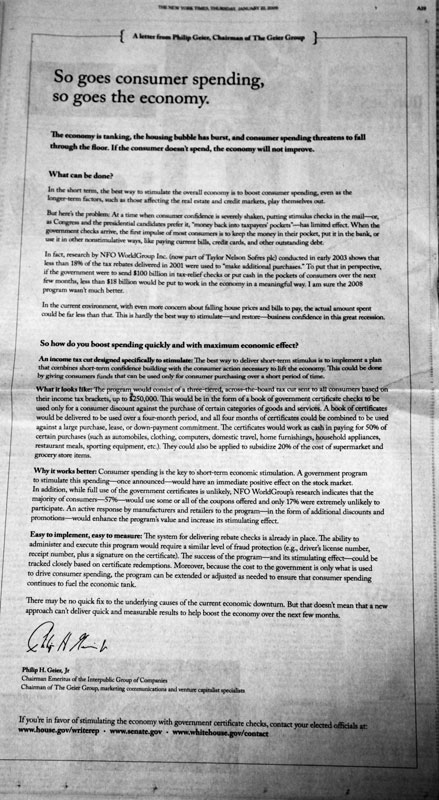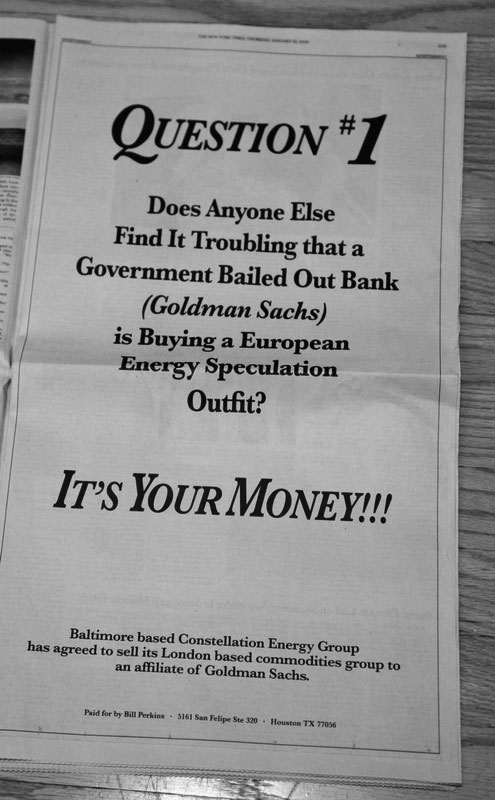One of the concrete benefits of open government data is that third parties can use the data to do something useful that no one in government has the mandate, resources, or insight to do. If you think what I am about to tell you below is cool, and helpful, then you are a supporter of open government data.
On my site GovTrack, you can now find comparisons of the text of H.R. 1, the stimulus bill, at different stages in its legislative life — including the House version (as passed) and the current Senate version (amendment 570).
The main page on GovTrack for HR 1 is:
http://www.govtrack.us/congress/bill.xpd?bill=h111-1
Here’s a direct link to the comparison:
http://www.govtrack.us/congress/billtext.xpd?bill=h111-1&version=as2&compareto=eh&view=side:Comparisons are possible between any two versions of the bill posted by GPO. Comparisons are available for any bill.
If you find this useful, please take a moment to consider that something like this is possible only when Congress takes data openness seriously. When GPO went online and THOMAS was created in the early 90s, they chose good data formats and access policies (mostly). But the work on open government data didn’t end 15 years ago. As “what’s hot” shifts to video and Twitter, the choices made today are going to impact whether or not these sources of data empower us in the future, whether or not we miss exciting opportunities such as having tools like the one above.
(Thanks to John Wonderlich and Peggy Garvin for some side discussion about this before my post. GovTrack wasn’t initially picking up the latest Senate versions because GPO seems to have gone out of its way to accommodate posting the latest versions before they were passed by the Senate, which is great, but caught GovTrack by surprise.)
Josh Tauberer
Category: Current Events
Bangle Bids Adieu
When it comes time to chart designer Chris Bangle’s contribution to the BMW brand’s aesthetic, few pundits will praise his pulchritudinous perversion of pistonhead passion, or thank him for the aesthetic affectations for which BMW is now known. In other words, the “Bangle Butt” will be Chris’ lasting legacy. Of course, this is also the man who removed the words “flame surfacing” from art school and placed them on the tip of his detractors’ tongues. That and Axis of White Power. (Oh! How we laughed!) Equally improbably, the Buckeye State native helped the expression “Dame Edna glasses” cross into the automotive lexicon. Yup. It’s been a wild ride. Literally.
CAR:
BMW design boss Chris Bangle is to leave the car industry, it was announced today. In a statement, BMW said Bangle was quitting ‘to pursue his own design-related endeavors beyond the auto industry.’
Bangle, 52, was the architect of the often controversial flame surfacing look that transformed BMW design from the Russian doll mentality of the 1990s to the edgy – some would say radical and divisive – styling of today.
The cars Bangle spannered
The outgoing design chief has overseen the launch of the current 1-, 3-, 5- and 7-series saloons and hatchbacks, as well as the raft of niche models that have seen BMW’s model range explode in recent years: the Z3, Z4, Z8, X3, X5, X6 and 6-series were all conceived on his watch.
Bangle grew up in Wausau, WI.
I give him a great deal of credit for dramatically changing what is often a very conservative business: car design.
“Government Checks for Consumer Spending?”

Philip Geier’s 232K PDF advertisement in today’s fishwrap edition of the New York Times. Use the grandkids credit cards to spend now…..
Our Tax Dollars Supporting Goldman Sach’s Latest Acquisition

Bill Perkins is at it again in the New York Times. More Bill Perkins activism on the bailout/splurge, here.
TARP Funds: State by State Analysis
In unveiling its bank-share purchase program, the Treasury Department required nine of the nation’s largest financial-services companies to sell a total of $125 billion in preferred stock to the government, and said an additional $125 billion in stock could be bought from other firms on a voluntary basis. Below, see a list of participating companies.
Madison’s Building “Boomlet”
Even as Madison, Wis., suffers arctic-like temperatures, there is a warm ray of hope for the commercial real-estate industry.
The city’s academic sector is seeing a building boomlet while developers in other parts of the country slam the brakes on new office buildings, stores and shopping centers.
A student-services hub at the University of Wisconsin-Madison is part of a larger mixed-use project called University Square.
About $600 million of new building projects are under construction on the University of Wisconsin-Madison campus and more than $450 million of additional projects are in the planning stage, said Alan Fish, associate vice chancellor of facilities planning and management at the university.A student-services center will officially open to students this week in a larger mixed-use development called University Square. The 1.1-million-square-foot project developed by Executive Management Inc., of Madison, also includes a rooftop garden, rental housing and about 125,000 square feet of retail space that is about 55% leased. The project, on the edge of the campus, is on land previously occupied by a one-story retail property, Mr. Fish said. Also under construction is the $150 million Wisconsin Institutes for Discovery, an interdisciplinary research complex scheduled to open in 2010.
The construction, part of a continuing effort to update the campus’s facilities since the 1990s, isn’t just changing the face of secluded ivory towers. “We’re smack dab in the middle of Madison,” Mr. Fish said. “Clearly the dynamism the campus has exhibited in the last five years has had a big ripple effect.”
600 Private Jets Expected for the Obama Nomination; 2X the 2004 Number
For the wealthy, Tuesday’s inauguration is the dream party: a chance to rub elbows with the similarly rich and powerful, to become part of a historic moment, and (most importantly), to get access to the man of the moment.
It also is a chance to drown their financial sorrows in an emotional wave of optimism.
Yet it may come as a surprise that at a time of financial crisis and Green correctness, many of the wealthy are choosing to arrive by private jet.
According to an article in Bloomberg, as many as 600 private jets were expected to touch down in D.C. for the inauguration. The runway at Washington Dulles was closed Saturday to allow as many as 100 small planes to park. And the Metropolitan Washington Airports Authority said it expected a total of 500 small jets to land from Jan. 16 through Jan 21.
“That would set a record, topping the 300 the airport accommodated for President George W. Bush’s 2004 inaugural,” an Airports Authority says in the article.
Refugees Abandoned on the High Seas
Doctor Side Pay from Drug Companies
Barry Fox is in big demand. The UW infectious disease specialist had lucrative side jobs working for seven different drug companies in just one year, including one that paid an undisclosed sum of $20,000 or more, records show.
Fox is one of dozens of University of Wisconsin-Madison physicians who also work for drug companies. Some sit on advisory boards; others do promotional or educational work. Fox, for example, did promotional work involving an antibiotic for one company in 2007, working five days for what appears to be at least $2,000 a day, his disclosure form says.
Doctors’ moonlighting for drug companies – though legal – is coming under increased scrutiny, both at UW and across the country. This month, the trade group Pharmaceutical Research and Manufacturers of America enacted a voluntary ban on company gifts of branded pens, sticky notes and other items and dinners for doctors. Also of special concern are university physicians who are sought by drug companies because of the influence and respect they wield with colleagues practicing in communities.
Most patients have no knowledge of the side work. Even the university is not aware of exactly how much its doctors earn from drug and medical device companies; they are required to disclose only ranges of income received, and no range beyond $20,000.
More than 30 UW physicians exceeded the $20,000 threshold in 2006 and 2007, records show. At least one of those doctors made at least 20 times that amount in previous years – more than $400,000, paid by a maker of orthopedic implants. But that became known in 2006 only because of records filed in a lawsuit.
Last week, for the first time, signs went up in a handful of UW Health clinics alerting patients about doctors’ drug company ties. In addition, the dean of the medical school said the university’s policies need to be shored up. Among other things, the medical school might begin requiring doctors to specify how much they are paid, said Robert Golden, head of the UW School of Medicine and Public Health.
Further, U.S. Sens. Herb Kohl (D-Wis.) and Chuck Grassley (R-Iowa) have introduced a bill that would require drug and medical device companies to disclose payments made to physicians. Kohl said it would be best to ban the practice, noting that the medical industry spends $20 billion a year in payments and gifts to doctors.
“The relationship between the doctor and patient is frayed,” Kohl said.
Vietnam imposes new blogging restrictions
AP:
The rules ban any posts that undermine national security, incite violence or crime, disclose state secrets, or include inaccurate information that could damage the reputation of individuals and organizations, according to a copy of the regulations obtained Wednesday by The Associated Press.
The rules, which were approved Dec. 18, attempt to rein in Vietnam’s booming blogosphere. It has become an alternative source of news for many in the communist country, where the media is state-controlled.
The new rules require Internet companies that provide blogging platforms to report to the government every six months and provide information about bloggers on request.
The companies are also required to prevent and remove content the government deems harmful.